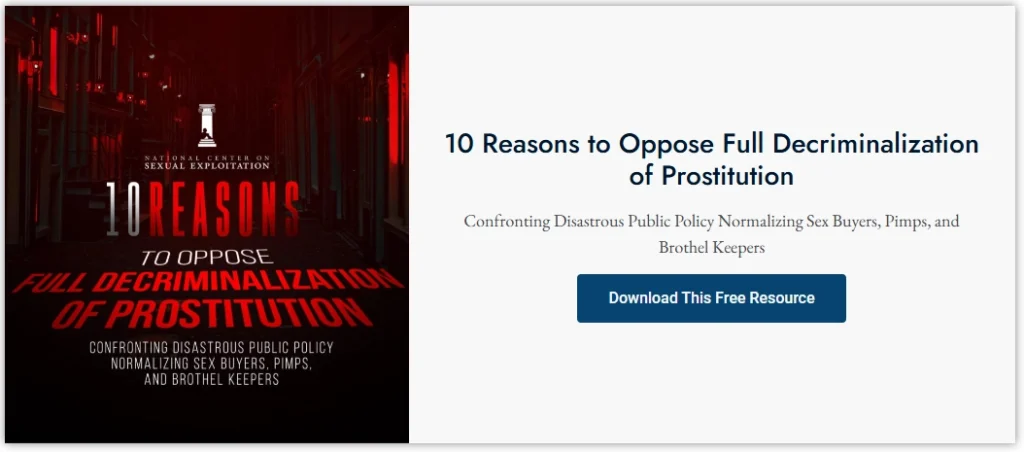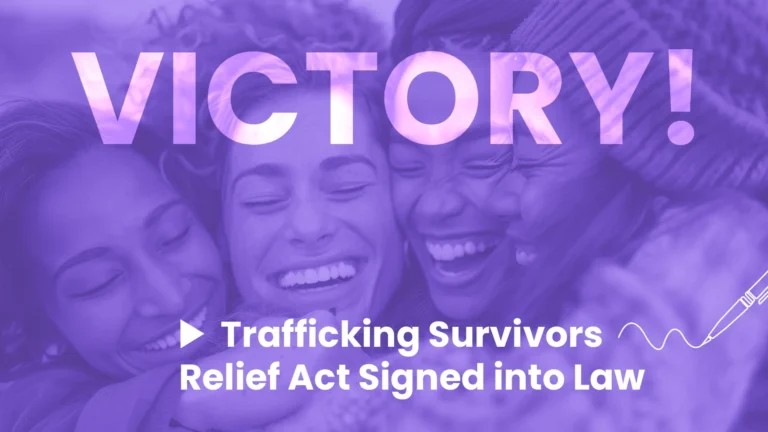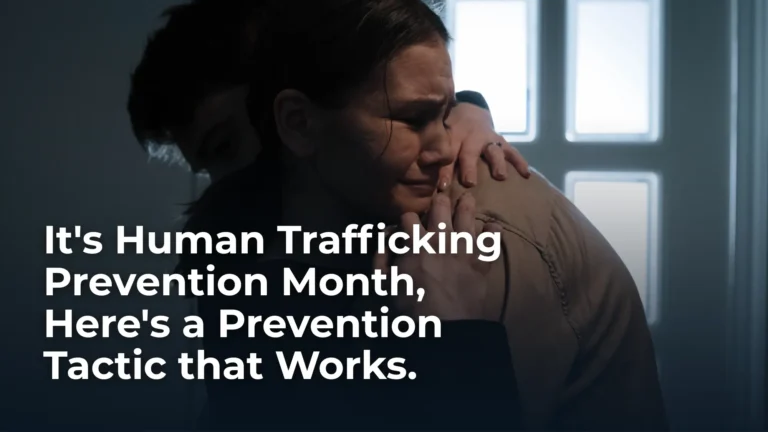This blog is part of a series: “Reality Check: Exposing Myths from the Pro-Prostitution Lobby” Read the other blogs in this series:
- 5 Arguments to Legalize or Fully Decriminalize Prostitution – DEBUNKED!
- 5 Things Sex Buyers Reveal About Prostitution
When walking home from school one day, Luna* was approached by a man who offered her $100 for sex. “I was in my school uniform, so there was no mistaking my age,” she recalled.
But after her father had committed suicide and her stepfather became abusive, she reluctantly accepted the man’s offer and used the money to run away. What started as a method of survival left Luna trapped in the clutches of prostitution for the next 24 years of her life.
In the beginning, she found solace in the “New Zealand Prostitutes’ Collective (NZPC),” where the members were advocates for full decriminalization of the sex trade—including pimping, sex buying, and brothel keeping. This was a stance Luna initially aligned with. But once these pleas for full decriminalization or legalization came to fruition, Luna’s idealistic view of fully decriminalized or legalized prostitution was altered by a dreadful reality.
She noticed many legal brothel owners offering “all-inclusive” deals, allowing sex buyers to do whatever they want with the prostituted women if they pay a certain price. One night, she witnessed a woman return from an “escort” shift having a panic attack, unable to speak, and the receptionist continuously yelled at her to “get back to work.”
When she went to report these instances to the NZPC whom she had previously found so much companionship from, they ignored her.
What Luna once thought was the key to a more dignified lifestyle actually seemed to serve as an avenue for violence towards people in prostitution.
*Name changed
Luna’s story is just one of many highlighting the gruesome reality of fully decriminalized or legalized prostitution. Proponents of full decriminalization or legalization attempt to obfuscate this reality by claiming prostitution is “a job like any other.”
Many argue that prostitution is no different than other jobs in which people use their bodies to perform work duties (e.g. manual labor, professional athletes, or even jobs that simply use one’s hands, like being a secretary or a dish washer). This argument is both illogical and dangerous. Here’s why.
1. Equating prostitution to jobs which use one’s body invalidates the trauma of rape and sexual assault
The reason that rape and other forms of sexual assault are illegal is because it is a violation of one’s personal boundaries in the most horrific way possible.
Sex is something that is intimate and personal. Sexual body parts are more sensitive and private than other body parts. But arguing that prostitution is the same as any other job that uses one’s body erodes the difference between sex and other physical acts, between sexual body parts and other body parts.
By this logic, the concept of sexual violence is rendered virtually meaningless. Shaking someone’s hand without first asking permission is equivalent to rape. A dad tickling his child is equivalent to him sexually abusing his child. A boyfriend pressuring his girlfriend into sex is equivalent to him trying to persuade her to play basketball with him.
These are all actions that force a person to use their body in a certain way, but certainly, we can all acknowledge that the implications of them are vastly different.
Because sex/sexual body parts are so deeply personal and intimate, it is necessary to handle them with especial sensitivity and care. Sexual consent must be given entirely freely, without any external pressures. Money should never be used to persuade someone into accepting sex that they don’t actually want. In the same way that most people would balk if a CEO told his female employees that they needed to have sex with him in order to get a raise, so too should we vehemently oppose prostitution.
2. The gritty reality of prostitution is radically different from real work
It’s all well and good to talk in abstract analogies. But let’s get concrete. Let’s get into the gritty reality of what prostituted persons actually experience—and we’ll see whether it can still be compared to a secretary or a dish washer.
Physical violence and rape are extremely common in prostitution. In Kampala, Uganda, researchers conducted a study of 1,467 women who were exploited in prostitution and found that 82% had experienced violence from sex buyers and 49 % had been raped at least once.
Even in countries where prostitution is fully decriminalized or legalized, violence and rape are still extremely prevalent. For example, a 2021 review of New Zealand’s legal framework on prostitution (which is often lauded by pro-prostitution advocates as the gold standard for full decriminalization) concluded that “violence is a risk every [prostituted person] takes on a daily basis: assault, rape and strangulation are not uncommon.” In India, where prostitution is legal, a study of 211 prostituted women found that 62% had been sexually assaulted by their male sex buyers in the first month of entry. 42% reported being forced or coerced into commercial sex and half of respondents had been exploited as minors.
Another aspect of the practice that poses a danger to prostituted people is the frequency of unprotected sex. Sex buyers are also often resistant to using condoms during their encounters. In Germany, where prostitution is legal, a 2017 study revealed that half of sex buyers in the sample reported unprotected sex between themselves and the prostituted person(s).

3. Deep psychological trauma should not be a consequence of work
The consequence of unwanted sex is deep psychological trauma. That’s not the same consequence for a basketball player, or for typing at a desk, or even for a boxer getting punched in the ring. They may have physical consequences for their job, but they aren’t traumatized in the same way that a plethora of research attributes to prostitution and sexual violence.
To highlight just a couple studies indicating this:
A 2012 study of 562 prostituted women conducted in Miami, Florida concluded that 74% of the sample reported severe symptoms of depression, anxiety, or traumatic stress. This greatly exceeded the approximately 6% prevalence of severe mental illness among the US general population at the time.
In a Swiss study, researchers interviewed 193 women in prostitution, who displayed higher rates of mental disorders than the general adult female population. These mental disorders were related to different forms of violence experienced by the women and the perceived burden of being in prostitution. At least half of the women experienced some form of psychiatric disorder within the past 12 months. The negative aspects associated with prostitution which “strongly affected” and “very strongly affected” them were: fear of infection (45%), leading a double life (40%), problems with intimate relationships (41%), demands by sex buyers (35%), sexual problems (34%), prostitution per se (34%), shame and feelings of guilt (31%), or the conditions within which prostitution takes place (31%).
The levels of violence and trauma that is experienced by those engaged in prostitution should not be dismissed as something that is just “part of the job.” If we make the mistake of treating it just like any other profession, the habitual violence embedded in the culture of prostitution will continue to exist in the shadows and the people affected will suffer in silence.
ACTION: Call on Your Legislators to Pass the Survivor Model!
Rather than legitimizing prostitution as a form of “work,” we need to recognize it for the exploitation that it is. Exploiters must be held accountable, and the exploited must be given support and services. The Survivor Model does both these things! Call on your legislators to pass this crucial model now.



